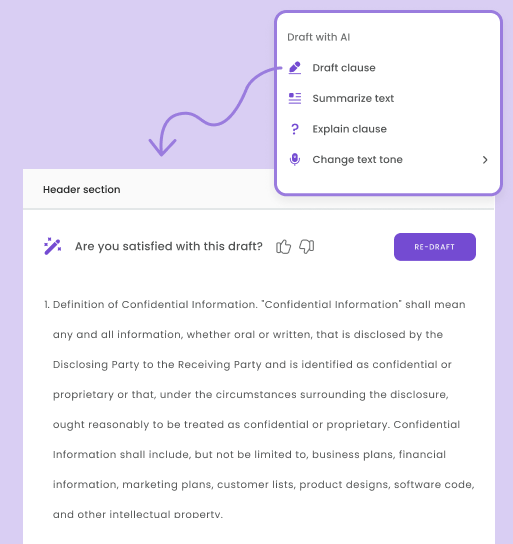Whether you realize it or not, the world revolves around sales. You have to sell an idea to your spouse, your partners, and potential clients. Some of those sales agreements are more formal than others which is why you should have multiple types of sales contracts in your arsenal.
In this guide, you’ll discover 6 important sales contracts, how they should be used, and their key components. By the end of this guide, you’ll be well-equipped to close more deals.
Understanding Sales Contracts
A sales contract, also known as a sales agreement, is a legally binding document that outlines the terms and conditions of a sale of goods or services between two parties. The purpose of a sales contract is to formalize the agreement and understanding between the buyer and the seller regarding the sale, including the price, quantity, quality, delivery terms, and other important aspects.
In addition to the core sales contract, there are many other types of contracts that enhance or facilitate a successful sale.
Elements of a Sales Contract:
- Parties Involved: Clearly identify the parties entering into the contract. This includes the buyer (purchaser) and the seller (vendor or supplier). Their legal names, contact information, and roles in the transaction should be included.
- Offer and Acceptance: The contract should clearly state the terms of the offer (what is being sold) and how it was accepted (acknowledgment by the other party). This can be as simple as the buyer agreeing to the seller’s terms and conditions.
- Consideration and Payment Terms: Outline the price that the buyer agrees to pay for the goods or services. Payment terms, such as the method of payment (e.g., cash, credit, check) and the timing of payments (e.g., upfront, installments, upon delivery), should also be specified.
- Goods or Services Description: Provide a detailed description of the goods or services being sold. This description should be clear and specific to avoid misunderstandings. It may include specifications, quantities, sizes, colors, and any other relevant details.
- Delivery and Performance Terms: Define the delivery terms, including the delivery date or timeline, location, and method of delivery. If the contract involves services, specify the performance expectations, including timelines and milestones.
- Warranties and Guarantees: Address any warranties or guarantees provided by the seller regarding the quality, condition, or performance of the goods or services. This section outlines the remedies available to the buyer if the goods or services do not meet the specified standards.
- Dispute Resolution Mechanisms: Include a section outlining how disputes between the parties will be resolved. This can involve mediation, arbitration, or other forms of alternative dispute resolution. The aim is to avoid costly and time-consuming litigation.
- Governing Law and Jurisdiction: Specify the governing law that will apply to the contract and which jurisdiction’s courts will have jurisdiction in case of disputes. This ensures consistency and provides clarity on legal matters.
Sales contracts serve as important legal documents that protect the rights and interests of both parties in a transaction. They establish clear expectations, reduce the likelihood of misunderstandings, and provide a framework for resolving potential disputes. It’s recommended to involve legal professionals when drafting or reviewing sales contracts to ensure they are enforceable and accurately reflect the parties’ intentions.
Common Types of Sales Contracts
Purchase Agreements:
- Definition and Scope: Purchase agreements outline the terms and conditions for the sale of goods from a seller to a buyer. They cover aspects like price, quantity, delivery terms, quality standards, and payment methods.
- Application in Different Industries: Purchase agreements are used in various industries, including manufacturing, retail, wholesale, and e-commerce, to formalize the sale of physical goods.
- Key Components: Key components include product description, quantity, price, payment terms, delivery terms, warranties, dispute resolution mechanisms, and governing law.
Service Agreements:
- Differentiating Goods and Services Contracts: Service agreements involve the provision of services rather than goods. They outline the scope, timeline, and compensation for services provided.
- Service Contract Essentials: Essential elements include service description, scope of work, compensation, milestones, timelines, intellectual property ownership, and terms for termination or modification.
- Ensuring Service Quality and Timelines: Service agreements should define quality standards, performance metrics, and penalties for delays to ensure that the services meet the agreed-upon standards.
Distribution Agreements:
- Roles of Distributors and Manufacturers: Distribution agreements define the relationship between manufacturers and distributors. Manufacturers provide products, and distributors sell and distribute them.
- Territory and Exclusivity Clauses: These agreements may specify exclusive territories for distributors or include clauses for non-compete and non-solicitation within the designated territory.
- Terms of Product Supply and Pricing: Distribution agreements outline terms for product supply, pricing, payment terms, and responsibilities for marketing and promotion.
Consignment Agreements:
- Consignor and Consignee Relationship: Consignment agreements involve a consignor (owner of goods) giving them to a consignee (seller) to sell on their behalf.
- Allocation of Risks and Responsibilities: Consignment agreements define how risks, losses, and damages to the goods are managed between the consignor and consignee.
- Payment and Inventory Management: These agreements cover how revenue is shared between parties, inventory tracking, reporting, and return processes.
Warranty Agreements:
- Express vs. Implied Warranties: Warranty agreements outline the terms under which sellers guarantee the quality, performance, and functionality of their products.
- Warranty Coverage and Limitations: These agreements specify the duration of the warranty, the conditions for warranty coverage, and any limitations or exclusions.
- Handling Warranty Claims: Warranty agreements describe the process for submitting and addressing warranty claims, including repairs, replacements, or refunds.
Confidentiality and Non-Disclosure Agreements (NDAs):
- Protecting Sensitive Information: NDAs protect sensitive information by imposing legal obligations on the parties not to disclose or misuse confidential information.
- Parties Bound by Confidentiality: The agreement defines who has access to the confidential information and under what circumstances.
- Consequences of NDA Breaches: NDAs outline the consequences of breaching confidentiality, including potential legal remedies such as damages or injunctions.
Understanding these common types of sales contracts is crucial for businesses to ensure their transactions are legally sound, well-documented, and mutually beneficial. Consultation with legal professionals is recommended to tailor these contracts to specific business needs and local legal requirements.
Tailoring Contracts to Your Business Needs
Customizing contracts to your business needs is an important step because you have unique needs and circumstances often change. A few of the more common reasons behind customization include:
- Accuracy: Generic contracts may not fully address your specific requirements and unique circumstances. Customization ensures that the terms accurately reflect the transaction.
- Risk Management: Tailored contracts can help mitigate potential risks by addressing industry-specific challenges, protecting intellectual property, and clarifying responsibilities.
- Clarity: Customized contracts lead to clearer communication between parties. Ambiguities and misunderstandings are reduced, minimizing the likelihood of disputes.
- Compliance: Different industries and jurisdictions have varying legal requirements. Customization helps ensure your contracts comply with applicable laws and regulations.
- Flexibility: Customized contracts can adapt to changing business conditions, technology advancements, and legal developments.
Incorporating Industry-Specific Clauses
Industry-specific clauses are essential to address unique aspects of your business and can smooth out any common issues faced in your industry. These include:
- Intellectual Property: Many industries involve IP considerations. Address ownership, licensing, and use of intellectual property rights in the contract.
- Confidentiality: Industries with sensitive information, such as technology or healthcare, require robust confidentiality clauses to protect proprietary data.
- Compliance: Industries like finance or healthcare have specific regulatory requirements. Contracts should reflect compliance with applicable laws.
- Performance Metrics: Contracts can include industry-specific performance metrics, quality standards, and benchmarks.
- Supply Chain: If you’re in manufacturing, logistics, or retail, clauses related to supply chain management, delivery, and quality control are crucial.
- Termination: Industries with long-term commitments, like construction, may need detailed termination clauses in case of unforeseen circumstances.
- Liability and Indemnity: Depending on your industry, you may need specific clauses addressing liability, indemnification, and limitations of liability.
- Service Level Agreements: For service-based industries, clearly outline service levels, response times, and consequences for not meeting commitments.
Customizing contracts requires a deep understanding of your business, industry, and relevant legal aspects. While it might involve additional effort and cost, tailored contracts offer a higher level of protection and transparency, reducing potential legal risks and ensuring a smoother business relationship.
Avoiding Common Pitfalls
Vague Terms and Ambiguous Language:
- Issue: Using vague or ambiguous language can lead to misunderstandings and disputes. Unclear terms can result in parties having different interpretations of the contract’s provisions.
- Solution: Be precise and specific when drafting contract terms. Clearly define terms, obligations, and expectations to leave no room for ambiguity.
Neglecting Dispute Resolution Mechanisms:
- Issue: Failing to include a clear dispute resolution mechanism can result in lengthy and costly legal battles if disagreements arise.
- Solution: Specify dispute resolution methods like mediation, arbitration, or litigation in your contract. Outline the steps and procedures for resolving disputes to minimize uncertainty.
Overlooking Intellectual Property Rights:
- Issue: Not addressing intellectual property rights can lead to disputes over ownership, usage, and protection of intellectual property.
- Solution: Clearly define ownership and usage rights for intellectual property created or exchanged under the contract. Include clauses on licensing, confidentiality, and how IP disputes will be handled.
Neglecting Applicable Laws and Regulations:
- Issue: Failing to consider local laws, regulations, and industry standards can lead to non-compliance and legal challenges.
- Solution: Ensure your contract complies with relevant laws, regulations, and industry standards. Seek legal advice if necessary.
To avoid these pitfalls, engage legal professionals who specialize in contract law. Customized, well-drafted contracts that address potential challenges and provide clear guidelines contribute to successful business relationships and minimize legal risks.
Conclusion
Sales contracts are useful tools that protect the interests of all parties involved. With that being said, it’s important to use the right type of contract for the right situation. At times, you’ll only need a purchase agreement while at others you’ll need things like distribution and warranty agreements to support it.
This guide has broken down the most common types of sales contracts and how to use them. Pick the ones that make the most sense for you and start tailoring them to your needs.
Be sure to check out DoxFlowy to automate and streamline your contract creation process.




